Support strong Canadian climate journalism for 2025
The federal government has extended its deadline for public feedback on a proposed Metro Vancouver shipping terminal after outcry from scientists, MPs and the City of Delta.
On Feb. 7, Delta city councillors voted unanimously against the controversial Roberts Bank Terminal 2 project because of the “immediate and irreversible” impacts it would have on sensitive mudflat ecosystems and shorebirds.
The city’s motion asks the federal government to reject the project or postpone its decision and do a regional environmental assessment of the Fraser River Estuary and the Salish Sea.
A dozen scientists added their voices to the cause with a signed letter to Environment Minister Steven Guilbeault arguing: “If the recovery of Canada’s endangered and iconic wildlife is a priority for the government of Canada, as stated, then it must reject the proposed Terminal 2 project.”
Their letter says the project would threaten southern resident orca whales and chinook salmon populations.
Shorebirds feed on the ecologically rich mudflats of the Fraser River Estuary, and Environment Canada scientists and other experts have said the project would cause “unmitigable, immediate, and irreversible” impacts to the ecosystem and shorebird populations.
The same day Delta council voted against the project, the NDP’s deputy critic of natural resources, MP Richard Cannings, rose during question period to ask the Liberal government to extend the consultation period for the proposed project because “critical information” was not available to the public. Cannings’ question highlighted key concerns raised in a letter NDP MPs sent to Guilbeault more than a week previous.
The outcry happened six days after Canada’s National Observer published a story about the federal government withholding comments from Environment Canada scientists during a key stage of the environmental assessment process.
“Project-induced changes to Roberts Bank constitute an unmitigable species-level risk to western sandpipers, and shorebirds more generally,” the comments that were withheld concluded, adding the only way to avoid the impacts “is with a project redesign.”
Throughout the process, the department said the project would cause irreparable damage to important shorebird habitat, but it failed to submit its closing remarks to the review panel.
In doing so, the department gave up an opportunity akin to making “your final arguments to the judge,” said Roger Emsley, executive director of Against Port Expansion, who obtained the closing remarks through an access-to-information request.
Eight days after the story broke, a notice on the Impact Assessment Agency of Canada’s website said the deadline for Canadians to submit written comments about the contentious $3.5-billion project had been extended from Feb. 13 to March 15.
Due to the “large volume of documents and information available for review on the project” and “requests to extend the ongoing comment period,” the Impact Assessment Agency decided to extend the deadline, according to a statement from Kaitlin Power, a ministry spokesperson with Environment and Climate Change Canada. This will “provide Indigenous groups and members of the public with additional time to review and comment on the information available on the Canadian Impact Assessment Registry.”
Emsley said the extension is a step in the right direction.
The public comment period began in December when many people are on holidays, and Emsley worried Canadians wouldn’t have enough time to review the countless pages of information and submit their own arguments.
“The extension to March 15 gives us more time to try to get answers from Ottawa,” said Emsley.
Guilbeault is expected to issue a decision soon after the comment period ends, and if he decides the project’s environmental impacts are too great, the Governor General will act on the advice of the federal cabinet to decide if the project will go ahead.
Natasha Bulowski / Local Journalism Initiative / Canada’s National Observer







Comments